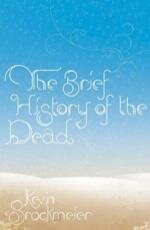

The Brief History of the Dead by Kevin Brockmeier
Reviewed by Claire Brialey
John Murray, London, 2006, 272pp, £12.99, h/b, ISBN 0-7195-6818-8
In the beginning is the city. Although you might not call it the beginning, or the end, or either customary combination of the two. But there is a city, and it is where people go when they die at least for a time. Literally, at least, it is an afterlife, but it is not a mythic existence; in the city, people are still people and they still think and feel and behave and to all intents and purposes live as people do in cities everywhere. And just as this is a sort of living, so there can come another sort of death; at least, sometimes people disappear from the city, and it's a popular belief that this happens when even their memories have faded away from the original world. When no one alive can remember you, it's time to move on again or, perhaps, to finally really just disappear. This is, then, the brief history of the dead. And now the city is becoming crowded, as an epidemic sweeps the world and more and more people are dying.
Meanwhile, Laura Byrd is dying too; she just doesn't know it yet, and even when she does there's no way she's going to give in and accept it. Laura is in the Antarctic, cut off from the epidemic and from virtually everyone else in the world. When she finds herself cut off from the rest of her scientific expedition, she resolves to save herself. As she struggles through the remainder of the world alone, she reflects on the story of her life; this, too, will soon be the brief history of the dead. Meanwhile, all of the people who feature in her memories live on, in the city.
The stories of the years of Laura's life, the final days of her life of earth, and the changes that face the cast of her life story in the city are elegantly woven to present a compelling and moving account of the journeys that all the characters take towards the moment of Laura's death. And we grow to know Laura through all these stories, from the memories others have of her as much as through her own memories or her actions and thoughts as she travels alone across a harsh and beautiful land.
This book, like both the Antarctic wilderness and the otherworldly city it describes, has a beauty all its own. It's a novel that invites engagement, but which also provokes reflection in the reader. How much do we think or care about how we appear to other people not just those we know well and see frequently, but those with whom we have only occasional, casual or passing encounters? How would it feel to have our lives described by the meaning we have given to everyone we meet especially when that meaning is another, albeit brief, slice of life? Figuratively speaking, this is the legacy that the living give to the dead and which readers give to writers: to have their brief histories recognised, and given new life through each retelling.
This article first appeared in Vector 248. Back issues of Vector are available from
